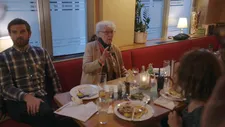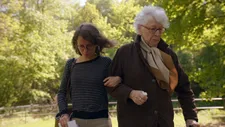 |
| Colette Marin-Catherine and Lucie Fouble honour Colette’s brother Jean-Pierre in Anthony Giacchino’s Oscar-winning Colette |
On April 25, 2021 Colette Marin-Catherine celebrated her 93rd birthday in France. Later that day, the 93rd Academy Awards ceremony was held in Los Angeles, which turned out to be not only a big night for Nomadland director Chloé Zhao (Best Film, Director, Actress Frances McDormand) when Marlee Matlin signed Colette, directed by Anthony Giacchino and produced with Alice Doyard as the winner of the Documentary Short Oscar.
 |
| Anthony Giacchino on Colette Marin-Catherine: “Today is Colette’s birthday, She was born just 22 days before the very first Oscars in 1929.” |
In accepting the Oscar in person Anthony Giacchino remarked: “Thank you to the Academy. I hope the actors in the room don’t mind that I have something written down here, because there are all different kinds of people in the Academy. Today is Colette’s birthday, She was born just 22 days before the very first Oscars in 1929. I imagine it must have been a crowd probably about this big, right? When we got nominated, she reminded us that the power of documentary filmmaking insured that her brother Jean-Pierre was, as she put it, no longer lost in the night and fog of the Nazi concentration camp system.
“I think it’s that same power of documentary storytelling that is going to insure that the memory, courage, and resilience of Latasha Harlins [Sophia Nahli Allison’s A Love Song For Latasha], Horace Bowers [Kris Bowers and Ben Proudfoot’s A Concerto Is A Conversation], the innocent children of Yemen [Skye Fitzgerald’s Hunger Ward], and the protesters in Hong Kong [Anders Hammer’s Do Not Split] are not forgotten. I mean, that’s why we do this, why we make these films, so thank you. We’re grateful that these stories and these individuals have been honoured tonight. Also, I would like to thank of course Colette and Lucy. I want to thank our amazing EP Peter Hirschmann at Electronic Arts, everyone at Electronic Arts and Respawn and Oculus, especially Vince, Dusty and Lauren and our producers Annie Small and Aaron Matthews - thank you so much to The Guardian’s Charlie Phillips, Jess Gormley and Lindsay Poulton - we share this award with you.”
 |
| Alice Doyard on Colette Marin-Catherine at La Carlotta: “It’s her favourite restaurant” |
Alice Doyard when accepting the Oscar in person: Just to add something: This award is a tribute and this film is a tribute to women everywhere in the world of any ages, who are joining hands and fight for justice. Vive Colette! And vive la France!
From London, Alice Doyard, and from New York, Anthony Giacchino, joined me on Zoom for an in-depth conversation on Colette, when the film received an Oscar nomination.
Anne-Katrin Titze: Of course, one of my favourite moments is when Colette puts the former mayor in his place. Alice, was that you who was there?
Alice Doyard: Yes, in the footage you see me. Normally people don’t see me because I’m behind the camera. There Anthony decided to keep it, because it was so strong.
Anthony Giacchino: It was too important, we had to have that. We didn’t even know the mayor was going to be there. He was only there because of someone who had been helping us with the film, who works in the police department in Nordhausen. He trains new recruits in the history of National Socialism to talk about what a police state is. He had been helping us to get a contact at Dora, but then he brought him. We invited Jens, but Jens brought the mayor. I didn’t see anything wrong with the mayor wanting to say something, but I didn’t realize that the mayor then would make it about himself. And Colette just shut it down. When Colette said we’re done then we turn off the camera.
 |
| Anthony Giacchino on the speech by Nordhausen’s former mayor: “When Colette said we’re done then we turn off the camera. ” |
AKT: It’s a perfect moment when you cut off. I liked so much the doublings, the mirroring in your film. You start with the mourning dove at Colette’s window and then you bring the bird sounds at Dora back in the end. Also you have two scenes in restaurants, one before she is leaving at La Carlotta, which signals Vertigo for any cinephile.
AG: It’s her favourite restaurant, also.
AKT: And the difference between that and the one in Nordhausen. Also the number 17, that her brother was 17 when he was arrested and that Lucie is 17.
AG: With the birds, it played out as it was. We just wanted to film with Colette around the apartment and she tells us “Come on, I’ll show you my friends outside.” She then opens the window and is clapping and looking at them.
AKT: The fact that it’s a mourning dove! And the mourning of her brother is the subject of your film.
AG: In the end when she is talking to Lucie, giving her the ring, after the pilgrimage is sort of over, and hearing the birds … Part of the strangeness of Dora is the beauty of the space. It’s in a forest, you always hear the birds and yet beneath the surface how terrible it is what happened there. We certainly didn’t plan it, but we found it in the edit. I wasn’t even connecting the bird thing when she was saying “Maybe Jean-Pierre is telling us he’s happy.” I wasn’t even thinking of the scene that we had filmed just a few days earlier.
 |
| Colette Marin-Catherine with Lucie Fouble at Dora |
AKT: Going to places like Dora, concentration camp locations in present time, you can’t help but think of Claude Lanzmann. Did you talk with Colette about him? Did she ever meet him? Was there any connection?
AG: No.
AKT: When you have shots of the tracks, for instance, his spirit is in this kind of filming, no?
AG: For sure, we talked about the remains and what is there. We were able to see the space before we went there with Colette. So we really had time to explore the space. To the credit of the memorial and the memorial foundation, they allowed us to go where we wanted.
AKT: I remember reading Thomas Pynchon’s Gravity’s Rainbow in college, about Dora and V-2 and how confused and flabbergasted and touched I was. Did you read Pynchon before going there?
AG: No, I didn’t. But now you’re giving me my next reading assignment.
AD: You know, with this film there’s a lot of discovery. And even afterwards. We will read this book with pleasure. In terms of things that happened afterwards, I discovered when I was showing the film to my own mother, that my great-uncle was in Dora, building the rocket. He did not meet Jean-Pierre, he left before Jean-Pierre. In Dora, I think, one out of three people died, and my great-uncle was lucky enough to come back. Now he is dead. He was a lovely man, full of compassion to the stories of others, and I would have loved to show him the film.
 |
| Colette gives Lucie Jean-Pierre’s ring and Lucie presents Colette the Stolperstein |
AKT: I think that’s why you make a film like this, it continues the communication. What Colette expresses when she gives Lucie the ring, saying “once you are 100 years old.” We do not stop telling this story because it is so important in order to stop the hatred and violence. Near the end, Lucie is holding in her hands a stone …
AG: You must know the Stolpersteine?
AKT: Stolperstein, yes, that’s what I thought it was.
AG: That’s exactly what she was holding. We had one made for Jean-Pierre that Lucie wanted to give to her. She was holding it there, we didn’t include it in the film. The following November, there was a ceremony outside of the childhood home of Colette and Jean-Pierre where they placed it there. Alice, you were there.
AD: Yeah, for Colette it was a very important moment, interestingly it was on the 11th of November. There were connections between the different wars. Colette was very relieved to have the feeling that her brother somehow was back home, with this Stolperstein in front of their childhood house, which is actually only a few kilometres away from her own house now, where the mourning dove is visiting. And together with this Stolperstein, Colette brought back a jar with some earth from Dora that she put in the garden of this house with the help of the new owners. Again there was a transmission of memory.
 |
| Alice Doyard: “Colette brought back a jar with some earth from Dora that she put in the garden of this house with the help of the new owners. Again there was a transmission of memory.” |
AKT: It’s a beautiful film you made. It’s wonderful to see someone like Colette. There aren’t many films made about women like her. There should be a big biopic with Cate Blanchett playing her, or someone like that. Don’t you think?
AG: For sure! The whole time we felt to ourselves, it’s too bad we only have 24 minutes. We could have done so much more with her. It’s only one part. I think it’s important to say that this is a film about part of her life. There’s so much more to explore.
AKT: Thank you!
AG: Thanks for talking to us!
AD: That was really an interesting conversation and do send us the name of the book!
Congratulations to all involved with Colette and I did send the title of Pynchon’s book to the filmmakers.
Read more of Anthony Giacchino and Alice Doyard on Colette.





















